#Mai Hirschfeld
Text
OH MY GOD The Four of Them ENDED and it was MAGNIFICENT?? Martina my forever blorboved T-T ❤💕 Her final character arc skfjfjdjsjdjfjdjakwjrks love that for herrrrrr
ANYWAYS time for an icon update of COURSE!! new Martina new me
#I'll post some nonlesbian aro versions tomorrow for you guys :))) Martina is for all aros after all 😌✨#the four of them#martina#mai hirschfeld#the four of them webtoon#i have been meaning to turn the lesbian flag rightside up again for a while now heheh#also im always kinda halfway interested in taking icon requests 👀
13 notes
·
View notes
Note
Rowling isn't denying holocaust. She just pointed out that burning of transgender health books is a lie as that form of cosmetic surgery didn't exist. But of course you knew that already, didn't you?
I was thinking I'd probably see one of you! You're wrong :) Let's review the history a bit, shall we?
In this case, what we're talking about is the Institut für Sexualwissenschaft, or in English, The Institute of Sexology. This Institute was founded and headed by a gay Jewish sexologist named Magnus Hirschfeld. It was founded in July of 1919 as the first sexology research clinic in the world, and was run as a private, non-profit clinic. Hirschfeld and the researchers who worked there would give out consultations, medical advice, and even treatments for free to their poorer clientele, as well as give thousands of lectures and build a unique library full of books on gender, sexuality, and eroticism. Of course, being a gay man, Hirschfeld focused a lot on the gay community and proving that homosexuality was natural and could not be "cured".
Hirschfeld was unique in his time because he believed that nobody's gender was either one or the other. Rather, he contended that everyone is a mixture of both male and female, with every individual having their own unique mix of traits.
This leads into the Institute's work with transgender patients. Hirschfeld was actually the one to coin the term "transsexual" in 1923, though this word didn't become popular phrasing until 30 years later when Harry Benjamin began expanding his research (I'll just be shortening it to trans for this brief overview.) For the Institute, their revolutionary work with gay men eventually began to attract other members of the LGBTA+, including of course trans people.
Contrary to what Anon says, sex reassignment surgery was first tested in 1912. It'd already being used on humans throughout Europe during the 1920's by the time a doctor at the Institute named Ludwig Levy-Lenz began performing it on patients in 1931. Hirschfeld was at first opposed, but he came around quickly because it lowered the rate of suicide among their trans patients. Not only was reassignment performed at the Institute, but both facial feminization and facial masculization surgery were also done.
The Institute employed some of these patients, gave them therapy to help with other issues, even gave some of the mentioned surgeries for free to this who could not afford it! They spoke out on their behalf to the public, even getting Berlin police to help them create "transvestite passes" to allow people to dress however they wanted without the threat of being arrested. They worked together to fight the law, including trying to strike down Paragraph 175, which made it illegal to be homosexual. The picture below is from their holiday party, Magnus Hirschfeld being the gentleman on the right with the fabulous mustache. Many of the other people in this photo are transgender.
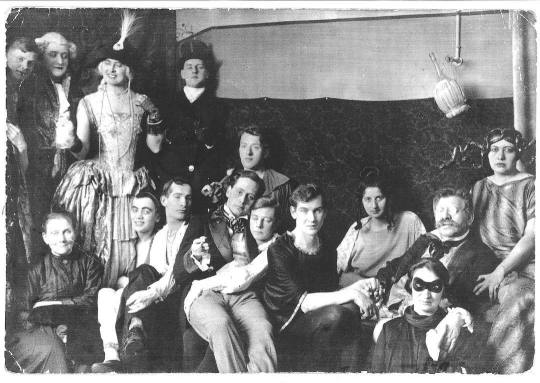
[Image ID: A black and white photo of a group of people. Some are smiling at the camera, others have serious expressions. Either way, they all seem to be happy. On the right side, an older gentleman in glasses- Magnus Hirschfeld- is sitting. He has short hair and a bushy mustache. He is resting one hand on the shoulder of the person in front of him. His other hand is being held by a person to his left. Another person to his right is holding his shoulder.]
There was always push back against the Institute, especially from conservatives who saw all of this as a bad thing. But conservatism can't stop progress without destroying it. They weren't willing to go that far for a good while. It all ended in March of 1933, when a new Chancellor was elected. The Nazis did not like homosexuals for several reasons. Chief among them, we break the boundaries of "normal" society. Shortly after the election, on May 6th, the book burnings began. The Jewish, gay, and obviously liberal Magnus Hirschfeld and his library of boundary-breaking literature was one of the very first targets. Thankfully, Hirschfeld was spared by virtue of being in Paris at the time (he would die in 1935, before the Nazis were able to invade France). His library wasn't so lucky.
This famous picture of the book burnings was taken after the Institute of Sexology had been raided. That's their books. Literature on so much about sexuality, eroticism, and gender, yes including their new work on trans people. This is the trans community's Alexandria. We're incredibly lucky that enough of it survived for Harry Benjamin and everyone who came after him was able to build on the Institute's work.
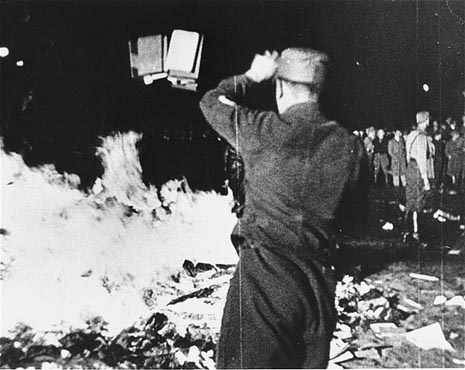
[Image ID: A black and white photo of the May Nazi book burning of the Institute of Sexology's library. A soldier, back facing the camera, is throwing a stack of books into the fire. In the background of the right side, a crowd is watching.]
As the Holocaust went on, the homosexuals of Germany became a targeted group. This did include transgender people, no matter what you say. To deny this reality is Holocaust denial. JK Rowling and everyone else who tries to pretend like this isn't reality is participating in that evil. You're agreeing with the Nazis.
But of course, you knew that already, didn't you?
Edit: Added image IDs. I apologize to those using screen readers for forgetting them. Please reblog this version instead.
#transgender#trans history#transsexual#transphobia#Magnus Hirschfeld#holocaust#holocaust denial#book burning#j.k. rowling#jk rowling#just in case you missed what i mean by all this: go fuck yourself anon :)#trans people have always existed#and we will always exist#if you really wanna pick a fight with me over well-documented history then you better bring in some sources to back your shit#queer history#queer#lgbt+#lgbta+#lgbt#lgbt history#edit: i finally got around to those damn image IDs. i am so very sorry for totally forgetting that's my bimbo moment of the month#also real quick i thought about adding an image of the actual building but the only one i can find has a Nazi parade in front of it#it was taken the day of the book burning raid and honestly if i were to include it then i'd add it to the first few paragraphs#and i think the story's better told when you uphold the hope Magnus Hirschfeld and all the researchers he worked with had#also keeps being brought up: yes Hirschfeld was a eugenicist. it was a popular belief set that was only discredited after WW2#Hirschfeld died in 1935. he literally didn't live long enough to see science turn against those beliefs and practices#considering how he changed his mind on transitions i like to think he would've changed his mind on eugenics too if he'd lived
16K notes
·
View notes
Text
To all the communist transvestites, VOTE👏VON👏HINDENBURG👏
I'm just as radical as you; I'm a proud member of the great Social Democratic Party of Germany! I don't know what the crazy communists are telling you, but Paul von Hindenburg is our only hope to defeat the Nazis. After we elect him, then we can discuss other politics, but this is the BARE MINIMUM, and if you don't vote for him, you clearly have this crazy purity test that'll bring us all to fascism.
I know you might be worried about his "senility" and "failing health", and I know you may not like him because of his push to the right, and I know you may be worried about the brownshirts, and the recent persecution of Dr. Hirschfeld and his work, and maybe you STILL haven't gotten over the whole Rosa Luxemburg stuff,
but none of that really matters! We need to keep the SPD in power, or else Hitler will get in charge! This is the most important and most basic thing you could do to help Germany stay a democracy. In 6 years, then maybe we can find a better candidate, but no matter what you think about von Hindenburg, he's the best shot we have at keeping the fascists out of power. We can totally push him left!
Any vote against von Hindenburg is a vote for Hitler. #Hindenburg1932
#find something better to do with your time#rather than pestering leftists to vote for a genocidal monster#you didn't push him left he pulled you right#go shut down iof and alt-right events like the rest of us#this exact situation has played out before#nazi germany#hitler#anarchism#communism#joe biden#biden#donald trump#vote blue#please vote#vote democrat#vote#fascism#rosa luxemburg#magnus hirschfeld#vote blue no matter who#fuck trump#go vote#us elections#kamala harris#2024 elections#election 2024#2024 presidential election#us presidential election#anarchist#leftist
1K notes
·
View notes
Text
My alternate universe fantasy colonial Hong Kong is more authoritarian and just as racist but less homophobic than in real life, should I change that?
@floatyhands asked:
I’m a Hongkonger working on a magical alternate universe dystopia set in what is basically British colonial Hong Kong in the late 1920s. My main character is a young upper middle-class Eurasian bisexual man.
I plan to keep the colony’s historical racial hierarchy in this universe, but I also want the fantasy quirks to mean that unlike in real life history, homosexuality was either recently decriminalized, or that the laws are barely enforced, because my boy deserves a break. Still, the institutions are quite homophobic, and this relative tolerance might not last. Meanwhile, due to other divergences (e.g. eldritch horrors, also the government’s even worse mishandling of the 1922 Seamen's Strike and the 1925 Canton-Hong Kong Strike), the colonial administration is a lot more authoritarian than it was in real history. This growing authoritarianism is not exclusive to the colony, and is part of a larger global trend in this universe.
I realize these worldbuilding decisions above may whitewash colonialism, or come off as choosing to ignore one colonial oppression in favor of exaggerating another. Is there any advice as to how I can address this issue? (Maybe I could have my character get away by bribing the cops, though institutional corruption is more associated with the 1960s?) Thank you!
Historical Precedent for Imperialistic Gay Rights
There is a recently-published book about this topic that might actually interest you: Racism And The Making of Gay Rights by Laurie Marhoefer (note: I have yet to read it, it’s on my list). It essentially describes how the modern gay rights movement was built from colonialism and imperialism.
The book covers Magnus Hirschfeld, a German sexologist in the early 1900s, and (one of) his lover(s), Li Shiu Tong, who he met in British Shanghai. Magnus is generally considered to have laid the groundwork for a lot of gay rights, and his research via the Institut für Sexualwissenschaft was a target of Nazi book-burnings, but he was working with imperial governments in an era where the British Empire was still everywhere.
Considering they both ended up speaking to multiple world leaders about natural human sexual variation both in terms of intersex issues and sexual attraction, your time period really isn’t that far off for people beginning to be slightly more open-minded—while also being deeply imperialist in other ways.
The thing about this particular time period is homosexuality as we know it was recently coming into play, starting with the trial of Oscar Wilde and the rise of Nazism. But between those two is a pretty wildly fluctuating gap of attitudes.
Oscar Wilde’s trial is generally considered the period where gay people, specifically men who loved men, started becoming a group to be disliked for disrupting social order. It was very public, very scandalous, and his fall from grace is one of the things that drove so many gay and/or queer men underground. It also helped produce some of the extremely queercoded classical literature of the Victorian and Edwardian eras (ex: Dracula), because so many writers were exploring what it meant to be seen as such negative forces. A lot of people hated Oscar Wilde for bringing the concept to such a public discussion point, when being discreet had been so important.
But come the 1920s, people were beginning to wonder if being gay was that bad, and Mangus Hirschfeld managed to do a world tour of speaking come the 1930s, before all of that was derailed by wwii. He (and/or Li Shiu Tong) were writing papers that were getting published and sent to various health departments about how being gay wasn’t an illness, and more just an “alternative” way of loving others.
This was also the era of Boston Marriages where wealthy single women lived together as partners (I’m sure there’s an mlm-equivalent but I cannot remember or find it). People were a lot less likely to care if you kept things discreet, so there might be less day to day homophobia than one would expect. Romantic friendships were everywhere, and were considered the ideal—the amount of affection you could express to your same-sex best friend was far above what is socially tolerable now.
Kaz Rowe has a lot of videos with cited bibliographies about various queer disasters [affectionate] of the late 1800s/early 1900s, not to mention a lot of other cultural oddities of the Victorian era (and how many of those attitudes have carried into modern day) so you can start to get the proper terms to look it up for yourself.
I know there’s a certain… mistrust of specifically queer media analysts on YouTube in the current. Well. Plagiarism/fact-creation scandal (if you don’t know about the fact-creation, check out Todd in the Shadows). I recommend Kaz because they have citations on screen and in the description that aren’t whole-cloth ripped off from wikipedia’s citation list (they’ve also been published via Getty Publications, a museum press).
For audio-preferring people (hi), a video is more accessible than text, and sometimes the exposure to stuff that’s able to pull exact terms can finally get you the resources you need. If text is more accessible, just jump to the description box/transcript and have fun. Consider them and their work a starting place, not a professor.
There is always a vulnerability in learning things, because we can never outrun our own confirmation bias and we always have limited time to chase down facts and sources—we can only do our best and be open to finding facts that disprove what we researched prior.
Colonialism’s Popularity Problem
Something about colonialism that I’ve rarely discussed is how some colonial empires actually “allow” certain types of “deviance” if that deviance will temporarily serve its ends. Namely, when colonialism needs to expand its territory, either from landing in a new area or having recently messed up and needing to re-charm the population.
By that I mean: if a fascist group is struggling to maintain popularity, it will often conditionally open its doors to all walks of life in order to capture a greater market. It will also pay its spokespeople for the privilege of serving their ends, often very well. Authoritarians know the power of having the token supporter from a marginalized group on payroll: it both opens you up directly to that person’s identity, and sways the moderates towards going “well they allow [person/group] so they can’t be that bad, and I prefer them.”
Like it or not, any marginalized group can have its fascist members, sometimes even masquerading as the progressives. Being marginalized does not automatically equate to not wanting fascism, because people tend to want fascist leaders they agree with instead of democracy and coalition building. People can also think that certain people are exaggerating the horrors of colonialism, because it doesn’t happen to good people, and look, they accept their friends who are good people, so they’re fine.
A dominant fascist group can absolutely use this to their advantage in order to gain more foot soldiers, which then increases their raw numbers, which puts them in enough power they can stop caring about opening their ranks, and only then do they turn on their “deviant” members. By the time they turn, it’s usually too late, and there’s often a lot of feelings of betrayal because the spokesperson (and those who liked them) thought they were accepted, instead of just used.
You said it yourself that this colonial government is even stricter than the historical equivalent—which could mean it needs some sort of leverage to maintain its popularity. “Allowing” gay people to be some variation of themselves would be an ideal solution to this, but it would come with a bunch of conditions. What those conditions are I couldn’t tell you—that’s for your own imagination, based off what this group’s ideal is, but some suggestions are “follow the traditional dating/friendship norms”, “have their own gender identity slightly to the left of the cis ideal”, and/or “pretend to never actually be dating but everyone knows and pretends to not care so long as they don’t out themselves”—that would signal to the reader that this is deeply conditional and about to all come apart.
It would, however, mean your poor boy is less likely to get a break, because he would be policed to be the “acceptable kind of gay” that the colonial government is currently tolerating (not unlike the way the States claims to support white cis same-sex couples in the suburbs but not bipoc queer-trans people in polycules). It also provides a more salient angle for this colonial government to come crashing down, if that’s the way this narrative goes.
Colonial governments are often looking for scapegoats; if gay people aren’t the current one, then they’d be offered a lot more freedom just to improve the public image of those in power. You have the opportunity to have the strikers be the current scapegoats, which would take the heat off many other groups—including those hit by homophobia.
In Conclusion
Personally, I’d take a more “gays for Trump” attitude about the colonialism and their apparent “lack” of homophobia—they’re just trying to regain popularity after mishandling a major scandal, and the gay people will be on the outs soon enough.
You could also take the more nuanced approach and see how imperialism shaped modern gay rights and just fast-track that in your time period, to give it the right flavour of imperialism. A lot of BIPOC lgbtqa+ people will tell you the modern gay rights movement is assimilationalist, colonialist, and other flavours of ick, so that angle is viable.
You can also make something that looks more accepting to the modern eye by leaning heavily on romantic friendships that encouraged people waxing poetic for their “best friends”, keeping the “lovers” part deeply on the down low, but is still restrictive and people just don’t talk about it in public unless it’s in euphemisms or among other same-sex-attracted people because there’s nothing wrong with loving your best friend, you just can’t go off and claim you’re a couple like a heterosexual couple is.
Either way, you’re not sanitizing colonialism inherently by having there be less modern-recognized homophobia in this deeply authoritarian setting. You just need to add some guard rails on it so that, sure, your character might be fine if he behaves, but there are still “deviants” that the government will not accept.
Because that’s, in the end, one of the core tenants that makes a government colonial: its acceptance of groups is frequently based on how closely you follow the rules and police others for not following them, and anyone who isn’t their ideal person will be on the outs eventually. But that doesn’t mean they can’t have a facade of pretending those rules are totally going to include people who are to the left of those ideals, if those people fit in every other ideal, or you’re safe only if you keep it quiet.
~ Leigh
#colonialism#colonization#worldbuilding#alternate history#history#lgbt#china#hong kong#british empire#ask
529 notes
·
View notes
Text

In 1931, sexologist Magnus Hirschfeld traveled the world and met trans people from six continents. These are four Javanese individuals we may now know as trans women that he met along the way. During this time, he called for decolonization, the end of the British Empire, and economic liberation. He knew all these systems were deeply interwoven with trans oppression.
I was particularly excited to find, restore, and colorize this photo because images of trans people from the Global South before the 1950s were incredibly rare.
1K notes
·
View notes
Text
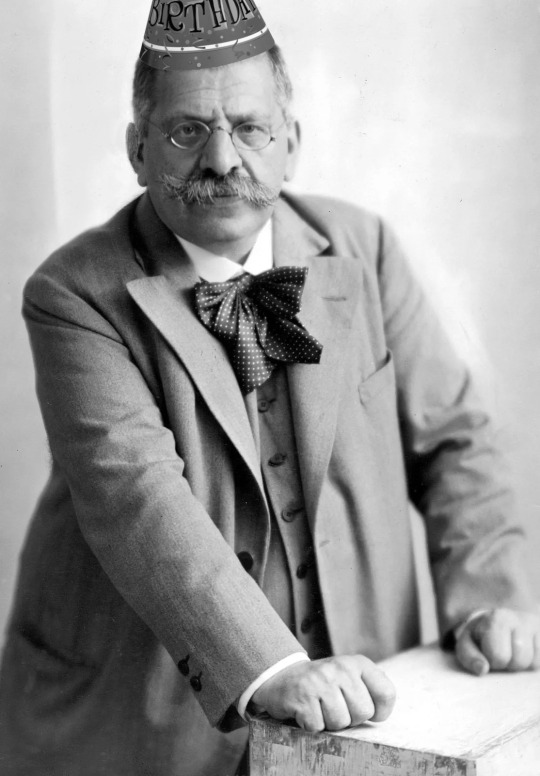
Happy birthday, Magnus Hirschfeld! (May 14, 1868)
A pioneering figure in the field of sexology, Magnus Hirschfeld was born in what is now Poland to an Ashkenazi family, the son of renowned physician Hermann Hirschfeld. After earning his medical degree, Hirschfeld spent some time in the United States and involved himself in the gay scene in Chicago, which would spur him to study sexuality and gender. Hirschfeld was struck by the universality of homosexuality and the fact that gay subcultures existed in most major cities, as well as the rate of suicide experienced by his gay patients. Hirschfeld worked tirelessly to normalize homosexuality in German society and foster greater acceptance, through both academic and political means. In the liberal atmosphere of Weimar Berlin, Hirschfeld found some measure of success, as the Social Democratic government of Prussia had no interest in enforcing federal laws against homosexuality. He founded the Institute for Sexual Research and built an immense archive of works relating to sexuality and gender research. Hirschfeld made the Institute his literal home, living there with his partner Karl Giese and his sister. Hirschfeld's fortunes would turn as first conservative Chancellor Franz von Papen seized the government of Prussia and began to crack down on homosexuality, and then the Nazi Party came to power in Germany. As a gay, Jewish socialist, Hirschfeld was a threefold target for the Nazis, and he never returned to Germany, having already been abroad on a speaking tour when the Nazis took power. The Institute was shut down and then ransacked, with its library burned. Hirschfeld would spend the rest of his life in Nice, France, dying in 1935.
“Soon the day will come when science will win victory over error, justice a victory over injustice, and human love a victory over human hatred and ignorance.”
341 notes
·
View notes
Text
Hayley Kiyoko Teams Up with 'Mage & Demon Queen' Creator Color_LES in Music-Inspired LGBT Webtoon
On Monday, Webtoons released "Forever," a one-shot comic created through a collaboration between musician Hayley Kiyoko and Mage & Demon Queen creator Color_LES.

"Forever" shows a young queer couple imagining their future and living a life together.
The webtoon is part of Love Stories, a collection celebrating pride month that pairs prominent musicians and with webtoon creators. Each week, Love Stories will release a new episode inspired by the artists' music. There are a total of three one-shot episodes, each featuring a different pairing of artist and creator.

The second episode, "Sleepwalker," is illustrated by Hannah Patten (Forever After) and inspired by Ava Max. Webtoon will release "Sleepwalker" on June 19. The third and final episode pairs MAY-A with The Four of Them creator Mai Hirschfeld and is scheduled for release on June 26.
You can read "Forever" and the other upcoming episodes of Love Stories for free on Webtoon.
#yuri#gay#lgbt#webtoon#gl#hayley kiyoko#pride#pride 2023#lgbtq#lgbtq+#queer#lesbian#trans#transgender#girls love#manga#anime
162 notes
·
View notes
Text
There is suffering, yes, there is despair and self-harm and ostracism. But Berlin’s Third Sex also offers something you may not expect of Wilhelmine Berlin — fun. To encounter Hirschfeld’s report today is to experience an electric charge of recognition. With its all-night parties, pansexual drag, and campy stage personas, with its elaborate codes of communication, layers of irony, and pop culture references, it reads like a dress rehearsal, in starched collars, for modern Western queer life.
47 notes
·
View notes
Text
TW: Suicide, misgendering & deadnaming

From January 14, 1860:
“An extraordinary case of a girl concealing her sex for many years, has been brought to light at Peitiers, France. Augustine, alias Augustus Baudouin, a young person of 17, was known in the town and neighborhood as an active lad, and had been in place in respectable houses as “odd boy.” This individual was lately tried for robbery, and while in prison, the authorities conceived some suspicion, and ascertained her to be female. On being asked what reason she had for wearing men's clothes, she said she had observed that men got their living easier than women; but she refused to give any information as to her birth and parentage. She was removed to the female wards, but her repugnance to appear in woman's attire among her fellow prisoners was so great, that she committed suicide by hanging herself on an iron bar with a pocket handkerchief.”
Augustus Baudouin gave the same excuse most other historical crossdressers AFAB did, that men had an easier time finding work or an easier life, which is why they crossdressed. I can think of only one man who, in the article about him, said that he had always wanted to be a boy. And it's clear why, because "I was so tired of my woman's place in society and needed food, so I simply had to dress as a man!" is a much better excuse than, potentially, "I feel like a man and I dress this way because I enjoy it." The former is much more likely to garner sympathy, while the latter exposes you as something unnatural.
But this one stood out to me, because Augustus committed suicide in prison after being forced to wear women's clothing and be called a woman's name. He refused to give the authorities any information on himself, and both that and his suicide imply that he was not a woman doing this for pure survival.
It also is impossible to hear about a trans man committing suicide after being outed and not draw connections to our modern life, where transmascs have some of the highest suicide attempt rates. This is not new- as long as there has been queerphobia there has been queer suicide, and it's an issue that has been addressed by queer activists since Magnus Hirschfeld and in Autobiography of an Androgyne.
I wish we could know more about Augustus outside of newspaper clippings written by cis people after his suicide, gawking over him as "an extraordinary case" after society directly led to his death. Like so many trans men&mascs, his story was told for him and his view on his own gender was erased. We don't know exactly how his assigned gender was "ascertained", or what he might have gone through in prison, or the circumstances that led him to living as he did before he was arrested. All we have left of him is the spectacle cis people made of him after his death.
Rest in peace, Augustus Baudouin. I'm sorry you were robbed of the life you deserve. Over a hundred years later, we remember you, and we remember every other transmasc who has been killed by transphobic society. Though you may have felt alone while you were living, now we know we aren't. We are organizing and fighting for a better world for all of us; I wish you could have seen it.
781 notes
·
View notes
Text
An excellent rundown from The Stranger on JKR's Holocaust denial. As a Jewish woman who lost actual family in the Holocaust, her twisting of the narrative is genuinely offensive and harmful.
Hey all, it’s Vivian. If you've freed yourself from wandering the wasteland of weirdos and robots on x.com, you may not have seen a series of tweets from JK Rowling about trans people and the Nazis. Rowling first questioned if Nazis ever burned research on trans people (they did) and then linked a thread excoriating problematic grandaddies in the field, implying that trans medicine carried on a eugenic or Nazi legacy of human experimentation (it doesn't).
I really hate inaccurate history, so I called someone who actually knows what the hell they're talking about, University of Washington's Laurie Marhoefer, the leading expert on trans people and the Nazis. You just can't unpack this complicated, nuanced bit of history in a tweet.

A memorial in Tel Aviv dedicated to the LGBTQ victims of the Holocaust. URIEL SINAI / GETTY
Yes, JK Rowling, the Nazis Did Persecute Trans People
We Asked the Leading Expert on the Topicallot Initiative Success in Western
VIVIAN MCCALL Last week, children's book author JK Rowling tweeted some more nonsense about transgender people. In this case, she disputed the fact that Nazis destroyed early research on the community:
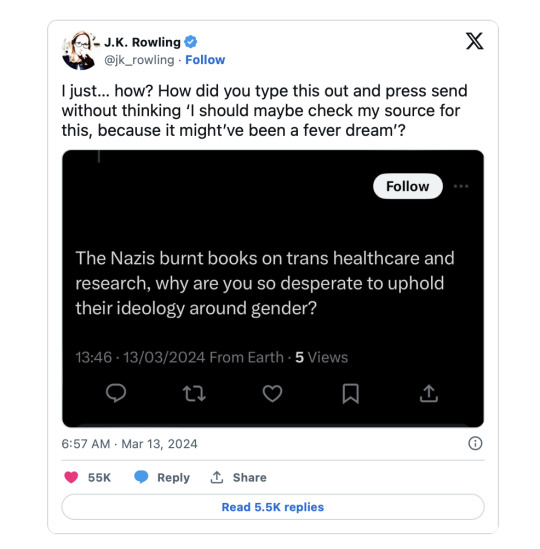
Despite Rowling’s dismissal, it is an established fact–not a fever dream–that the Nazis persecuted transgender people. And it’s not the first time this debate has come up on social media. Denying this history is part of an overall effort to discount the discrimination trans people still face in their pursuit of fundamental rights today. It is important to remember the truth and to evaluate what research we have, especially at a time when far-right attacks against trans people are increasing in the United States and elsewhere.
The Looting and Burning
In 1933, the Nazi-supporting youth with the German Student Union and SA paramilitary looted the Institute for Sexual Science (Institut für Sexualwissenschaft) in Berlin. The institute collected the earliest known research on gay and transgender people, and it helped people obtain legal name changes, medical treatments, and “transvestite certificates” from local police that allowed them legally to present as their gender.
Days after the looting, Nazis took to the streets to burn the 20,000 books looters found inside the building, and they placed a bust of the institute’s founder, Magnus Hirschfeld, on the pile in effigy. Hirschfeld was out of the country at the time, but he later died in exile in 1935.
In the years that followed, trans people were busted under German laws criminalizing sodomy and wearing clothes associated with their birth sex. They were imprisoned in concentration camps before and after the start of World War II. Some were murdered there. Others escaped with their lives.
We’ve Been Here Before
Since Rowling posted about the subject on x.com, misinformation about trans people in Nazi Germany has circulated widely. Some people have also claimed that the discussion of trans victims of Nazi violence distracts from the “real victims” of National Socialism. In light of this discourse, I called the leading researcher studying trans people and the Nazis, University of Washington professor Laurie Marhoefer.
“My first reaction was, they’re totally wrong,” Marhoefer said of the posts. “They’re not even in the ballpark. My reaction 1.5 was, ‘Oh this is eerie, the same thing happened in Germany two years ago.’”
Back in July of 2022, a graduate biology student named Marie-Luise Vollbrecht, who was known for her “gender critical” anti-trans views, made headlines in Germany.
She tweeted that the Nazis had never targeted trans people, and to say they did “mock[ed] the true victims of the Nazi crimes.” People responded with a hashtag that claimed she denied Nazi crimes. Vollbrecht filed a lawsuit against some of them, claiming their hashtag violated her rights and basically called her a holocaust-denier, which is a crime in Germany. She lost her case, and, after parsing the historical facts, the court officially recognized trans people as Nazi victims. A few months later, Germany’s parliament issued a statement recognizing the queer victims of Nazis and of post-war persecution.
We Don’t Know Much, but What We Do Know Is Grim
That ruling aside, this history is by no means complete. Scholars still don’t know much about the lives of trans people in Nazi Germany. Researchers have only recently started to study the subject and to undo false assumptions that cis gay men and transgender women were essentially viewed as the same in the eyes of their oppressors.
Through years of research and the review of published literature, Marhoefer has identified 27 criminal cases involving trans men, women, and gender nonconforming people in Nazi Germany. Locating them is hard work, and it requires parsing heaps of documents in non-keyword-searchable archives to find police files on a very small group of people that did everything in their power to avoid police detection. Marhoefer has 30,000 Gestapo files on their laptop alone. The little we do know, so far, is grim.
According to research from Marhoefer, beginning in 1933, Hamburg police were instructed to send “transvestites” to concentration camps. A person named H. Bode lived in the city, dated men, dressed in women’s clothes, and once held a “transvestite” certificate. After multiple public indecency and public nuisance convictions, she was sent to Buchenwald, where she died in 1943. Liddy Bacroff, a trans sex worker in Hamburg, died at Mauthausen the same year. Officials sent her there because she was a “morals criminal of the worst sort.”
Essen police ordered Toni Simon to stop wearing women's clothes, as she had done for years. She served a year in prison for disrespecting police officers, hanging out with gays, and speaking against the regime. The authorities called Simon a “pronounced transvestite,” and a Gestapo officer said placement in a concentration camp was “absolutely necessary.” She ultimately survived.
Unlike today, Marhoefer said, trans people were never a front-and-center political issue for the Nazis, nor were they rounded up in the same systematic way as Jews or the Roma. Nevertheless, the Nazis did specifically target them for their gender identities. On a fundamental level, transness was incongruous with Nazi ideology, a hyper-masculine fascism that emphasized purity and traditional gender roles.
The enforcement of moral laws prevented them from living as they did in the Weimar Republic era, the democratic government in power before Adolf Hitler and a time of limited acceptance. Magazines, nightclubs such as the Eldorado, and nascent organizations for trans people were shuttered. The state forced detransition, revoking a permit from at least one person named Gerd R. and driving them to suicide.
“I think we expect the crackdown, and then it’s all over their media, but it’s quiet,” Marhoefer said. “How many in a camp do we have to find before people will be like, ‘Okay, there was persecution?’”
While the Nazis did not often discuss transness much, at least one 1938 book, Ein Beitrag zum Problem des Transvestitismus, provides some idea of how party officials thought about trans people.
Author Hermann Ferdinand Voss described trans people as “asocial” and likely criminals, which justified “draconian measures by the state.” Nazi rhetoric also linked trans women and pedophilia, which mirrors the contemporary allegations from conservative Republicans about trans and queer people “grooming” children.
When they came after Hirschfeld, who was gay and Jewish, propagandists also framed homosexuality as a Jewish plot to feminize men and to destroy the race. Years before Nazis stormed his institute, the pro-party newspaper Der Stürmer labeled him the most dangerous Jew in Germany, which brings us to another point Rowling shared in a thread on X.
Problematic Granddaddies
After x.com users told Rowling that Nazis did, in fact, persecute trans people and burn research about them, she accused people who corrected her of valorizing Hirschfeld, rather than doing what they were actually doing, which was simply correcting the record.
Indeed, Hirschfeld, the granddaddy of the gay rights movement and a pioneer for trans health care, was a eugenicist. Furthermore, the early practitioner of vaginoplasty, Erwin Gohrbandt, who operated on Lili Elbe of The Danish Girl fame, was a Nazi collaborator connected to Dachau.
History rightly doesn’t look back on eugenicists and Nazi collaborators fondly, but those facts have nothing to do with whether or not Nazis persecuted trans people or burned research.
Apparently unsatisfied with spreading historical misinformation in one instance, Rowling followed-up with a tweet that directed users to a “thread on the persistent claims about trans people and the Nazis.” The thread implies that trans medicine is eugenic or Nazi in some way, and it draws a false connection between gender-affirming care and tortuous human experiments in the camps.
Broadly, the thread argues that early trans medical care constituted medical malpractice and the development of a new kind of sterilization in the form of gender-affirming genital surgery, and it contends that Gohrbandt performed his early vaginoplasties with the same regard for humanity as he displayed in his later work with the Nazis.
But the beliefs of these flawed medical pioneers have no bearing on trans people or trans politics, and conflating modern gender-affirming care with this early experimental treatment ignores the state violence trans people faced at the hands of the Nazis.
Despite Hirschfeld’s contributions to the field, people are right to criticize him for seeing the world through the lens of eugenics, even if that view was common in the 1930s.
Marhoefer literally wrote the book on his eugenic beliefs. Hirschfeld thought that gayness was eugenically beneficial because queer people did not reproduce, but he made no eugenic arguments for or against his work with trans people. He dedicated one of his books to eugenics, and he believed they sat at the heart of the science of sexology. And while he was critical of scientific racism, you can find anti-Black statements in his work, too, Marhoefer said.
Moreover, while Hirschfeld’s writings suggest he empathized with trans people and wanted to alleviate their suffering, he still staked a career on them. He photographed trans people in demeaning ways and trotted them out for demonstrations in front of other doctors.
It’s important to remember that Hirschfeld did not invent or create transness. The community existed before he discovered it, and the trans people themselves were not advocating for eugenic sterilization. The man was a trailblazer, not a saint. In fact, his approach to trans medicine laid the foundation for a system that forces people to jump through hoops for medical care. To this day, the majority of people who do trans medicine are not transgender themselves, and they do not always have the best interests of trans people at heart, Marhoefer said.
Gohrbandt would certainly make a list of medical practitioners who did not always have the best interests of trans people at heart. The pioneering plastic surgeon’s career bloomed along with his field, which quickly advanced to treat disfiguring battlefield injuries from World War I. He did not work at the institute, and because the surgeries were still very rare, he didn’t make a living performing them, Marhoefer said. We can count on one hand the number of gender-affirming surgeries he performed.
Unlike the Jewish and leftist doctors he worked with, Gohrbandt did not have to flee Germany. He endorsed the regime and later became the chief medical advisor for the Luftwaffe’s sanitary services division. In 1942, he participated in a secret conference on the results of fatal hypothermia experiments performed on Holocaust victims, and later reported the results in a German surgical journal.
Marhoefer said it is not strange that a future Nazi worked with progressive Jews on gender-affirming care in the 1920s. Many German doctors backed the regime and committed atrocities because they wanted careers.
There’s no defending Gohrbandt, but his path does not suggest anything unique and nefarious about gender-affirming care. It says more about the heartbreaking situation these trans people found themselves in when even the few doctors they could turn to for medical care treated them with disdain.
Marhoefer said doctors of the day took advantage of desperate women such as Elbe, Dora Richter, and Charlotte Charlaque, who was Jewish and fled the Nazis. They endured experimental surgeries with no oversight before antibiotics, patients’ rights, or ethics protections. Many doctors saw them as a means to an end in the overall development of plastic surgery.
What All of This Is Really About
Trans persecution is simply one story in a much larger one about the Holocaust. Trans people today who point out this history as right-wing attacks against them intensify around the world are not erasing the murder of Jews and Roma in concentration camps, or the extermination of disabled people, or the deaths of millions of Soviet POWS in Nazi Germany’s murderous campaign to seize eastern territory and farmland.
But this conversation is not really about Nazis any more than constant squabbles over gender-affirming care are about children. Nor does it honor victims of Nazi crimes.
No information, scholarship, or detailed account of a complicated history can satisfy someone who is fundamentally opposed to a person existing as they do. No number of mainstream medical organizations that again and again defend the efficacy of gender-affirming care can assuage their doubts. The benchmark for correctness is constantly moving and shifting, and the argument has no logical endpoint.
Meanwhile, ordinary trans people who rise to their own defense are labeled activists and needled for their wording, or their temperament, or their appearance, or the smallest misstatement.
At the same time, people like Rowling expect transgender laypeople to possess the knowledge of Holocaust researchers, of doctors, of psychologists, and of public policy experts. Every week, it seems, anti-trans interests push out another poorly researched hit meant to undermine the community’s existence in some way. It is trolling, and it is exhausting, and that’s all it is.
23 notes
·
View notes
Text
On 6 May, fanatical Nazi students raided the Institut für Sexualwissenschaft, roughly translated as the Institute of Sexology. Tens of thousands of books, papers and research were taken from shelves and burned.
The institute, headed by Magnus Hirschfeld, was an academic foundation devoted to sexological research and studies on the experiences of transgender people. It also offered some of the first modern gender-affirmation surgeries in the world.
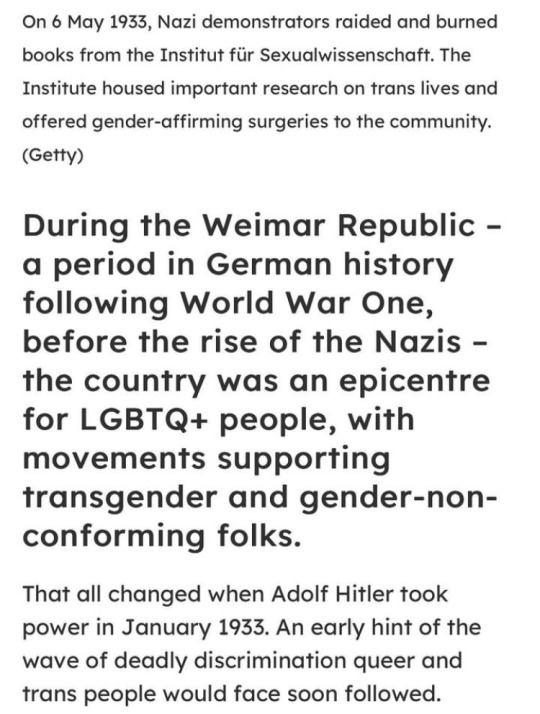
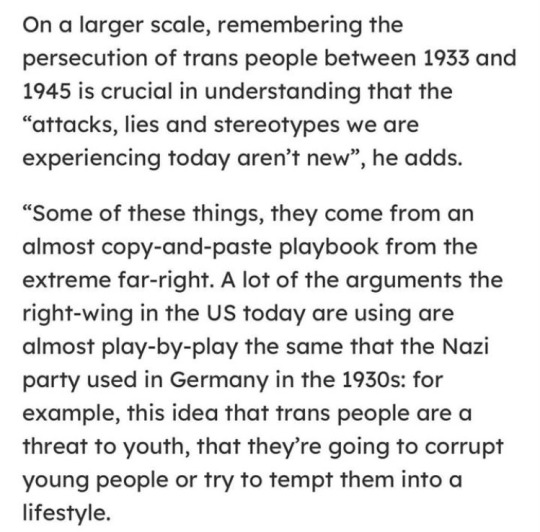
#lgbt#lgbtqia#lgbtq community#lgbtq#lgbtqia+#lgbtqiia+#lgbtqplus#social justice#history#history tumblr#history side of tumblr#wwii#ww2 history#ww2#ww2 germany#trans community#queer#queer community#political#political posting#politics#human rights#trans#history posting
23 notes
·
View notes
Text
On This Day In History
May 6th, 1933: The Deutsche Studentenschaft (German Student Union) attacked the Hirschfeld Institut fur Sexualwissenschaft, appropriating about 20,000 books and articles, as well as 5,000 images, to be destroyed. It is suspected, but not confirmed, that a transwoman named Dora Richter was killed either in the attack of in custody.
#history#world history#nazis#holocaust#book burnings#magnus hirschfeld#institue for sexology#germany#german history#jewish history
73 notes
·
View notes
Note
I’m sorry I’m new to the lgbtq community and I’m just wondering what’s the difference between transgender, transsexual, and transvestite? Sorry if this is a dumb question or seems offensive in any way. Im just genuinely curious.
That's fine, I don't think people genuinely expect newcomers to have a dictionary implanted in your brain on all the terms, we've all got to learn it somewhere
I do want to preface this by saying that these are general descriptions and by no means are universal. Each person has their own relationships with these words, and that will impact which ones they will use. This is important to remember, I think, because it offers more compassion and understanding toward others.
Transgender: This is the newest term of the three, and rose in popularity as a response to people's need to describe themself with a word that was more neutral. Transgender people are very varied in trans identity and transition status and gender identity. It's a wide umbrella
Transsexual: Historically used for trans people who are medically transitioning (e.g. hormones, surgery). There was a heavy emphasis on the medicalization of transness, especially for dysphoria. This is why the need arose for the term transgender because not every trans person pursues medical transition, or only goes so far with it (e.g. only going on hormones and not undertaking surgery). In recent years, people have rediscovered transsexual, and honestly, I have seen a ton of different people use this word. Some transsexuals will medically transition, some will not, some have dysphoria, and still, some don't. Transsexuals are so varied- just like transgender people. Transsexual doesn't necessarily denote one's sexuality - it typically denotes that one's sex is changing. It can be confusing at first, but transsexual isn't necessarily saying anything about one's sexuality.
Transvestite: Historically used to denote cross-dressing and/or a trans identity. Before the words "transsexual" and "transgender," many people we might recognize as transgender/transsexual would have been called a transvestite. In some contexts, this word is derogatory, as it has been used to diagnose mental conditions. However, there are people today who self-identify as transvestites - this may be because they are just a cross-dresser or because they are gender diverse. Magnus Hirschfeld is to thank for this term, and it helped put the foot in the door for trans and gender diverse advocacy.
Transsexual and transvestite are considered outdated by many, but I do not think they are inherently bad. They had their place when they were popularized and coined, and they helped give language to our gender diverse predecessors. So many gender diverse people use different language to describe themselves, and I believe that we need to give each other that space. I am a transsexual, for example, and I believe we need to give each other the space to use language that describes them.
#ask#trans#transgender#transsexual#transvestite#lgbt#lgbtq#ftm#mtf#nonbinary#hopefully this addresses everything and it's understandable#i'm never going to rag on y'all for asking questions. that is completely natural <3
66 notes
·
View notes
Text
How would you feel about us opening the ask box?
So... we have a giant backlog of years-old messages. Some of the questions may or may not be relevant anymore to their askers. Some are from deactivated blogs. Some are things we've struggled to answer. Etc.
The backlog of asks has prevented us from opening the ask box.
So we want to ask you as readers and writers what your opinion is. Longer explanation below.
Life happens, and this is all volunteer-run. But I am sorry for all of you who wrote to us over the past few years only for us to not have the capacity to answer at the time.
Something we have done in the past was briefly open asks to help us get the momentum going, while we chipped away at older asks that required more research or reaching out to guest mods with identities we don't have. Or slowly getting to answering questions about our own trauma in order to help someone else write it in a way that respected its gravity.
With opening the ask box then, it also meant that the mountain continued to grow large. In an ideal world, we'd be able to answer every ask quickly.
I realize folks will see this and reply with, "why not just get new mods?"
Taking on new mods requires figuring out what an application looks like, reaching out to demographics besides our own (and knowing where to do this, and the right way, considering this is an unpaid gig), interviewing, and training new mods in how the ScriptFamily group of blogs operates. And generally, even when people go through all that process, very few people are able to maintain activity on the blog. Which is understandable! We are all in that boat! (ALSO. This isn't a sideblog, so it requires logging in and out, or using another browser, pls advise if you know a workaround. ) So the balance of labour put in to bring on new mods, vs. labour saved by it, is a HUGE roll of the dice.
I say all this not to discourage people from asking tough questions. Only to hopefully give some insight into why some asks take so long, and that it's because I've been researching Molly Houses from their heyday for like 5 years and figuring out what a Bavarian asexual man would call himself in 1920 using repatriated texts from the Magnus Hirschfeld Institute, typed manually and auto-translated. And also... someone asked about the omegaverse, AKA the A/B/O trope and transness this one time and... we all have a lot to say, haha. It's a lot to unpack! But we're passionate. And I hope as we work through asks in the future, our archive will help us better be able to help you.
But IDK, what are your thoughts on all this? Should we just go through the backlog very slowly (regardless of the age of the asks)? Or do you want the ask box opened for your current questions?
11 notes
·
View notes
Note
Hiii! This question is kinda apropos of nothing but I’m curious: who is the person in your profile pic? Every time I scroll past it a little too fast I think it’s Alan Alda/Hawkeye haha
no worries (i think alan alda would be honoured, if i remember correctly, he mentioned meeting him once as a kid in his memoir). it's this fellow:
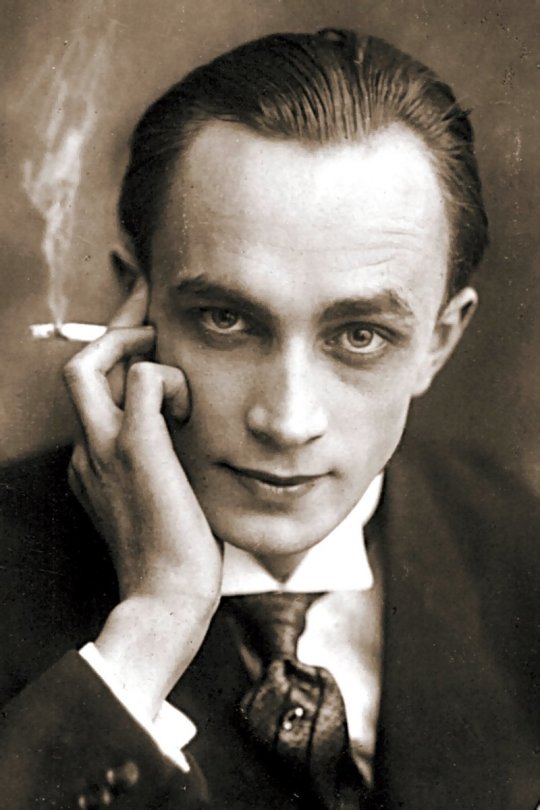

his name was conrad veidt, a famous german actor of the weimar republic, later escaped to britain and then the us to get away from the nazis with his jewish wife, Ilona Prager. he also starred in two pro-jewish films shortly after the nazis came to power in 1933 (the wandering jew, and jew süss, but i confess i haven't watched these yet, so i cannot say how well they aged) -- generally did a few films that were about Social Issues that came down on the side of the oppressed, including the woman's crusade, and the merry-go-round, as well as... (see below)
famous for some very important movies:
1. played the lead in the first movie to openly portray gay men (anders als die andern), which was produced by magnus hirschfeld and the institute of sexology in a bid to get support for legalising homosexuality -- it's free on youtube! also 105 years old, can you believe...
2. played the somnambulist in the cabinet of dr caligari, and generally was every vamp-girls/boys dream back in the day, playing in a lot of the german expressionist films and proto-horror films, and generally not afraid to play offbeat, uncomfortable roles that weren't about being an attractive leading man (eerie tales, the hands of orlac, waxworks, the man who laughs)
3. after he moved to the us, he was very happy to portray nazis to give them realism, and he plays major heinrich strasser in casablanca in 1942 (his second-last film)
i believe he was in a total of 115 films, but quite a few of them between when he started in 1917 and 1930 are lost (der januskopf, i think of you often....murnau, bela lugosi, and conrad veidt, in an adaptation of jekyll and hyde??? arghhh)
other fun facts, did occasionally crossdress and in fact this may have contributed a little to his first divorce, as his wife found him and a bunch of his friends wearing dresses one night after she came back from work -- notably conrad was in her new dress. she told a friend that this was the breaking point, but it may have partially been a joke. they did divorce though
was also at one point called the prettiest girl in berlin in print, good for him
was probably bisexual, although having said that i've actually never read why people think this -- so for now, he was a mensch and a great ally to a lot of people, a little on the queerer side in all things
i do follow a fair few conrad veidt blogs on here, but i don't talk about him often, it's one of those "am a fan, but keeping it mostly to the chest" kind of things with him -- however, as you can tell, very happy to give the Info when asked!
that's the man, the girl, the pretty boy: mr conrad veidt!
#conrad veidt#really i ought to get a book on him to fill in the gaps in my knowledge#a lot of the time im happy to just chill with what i know and different articles but.. i like a good book#weimar republic#weimar berlin#anders als die andern#queer history#queer cinema#cabinet of dr caligari#casablanca
14 notes
·
View notes
Text


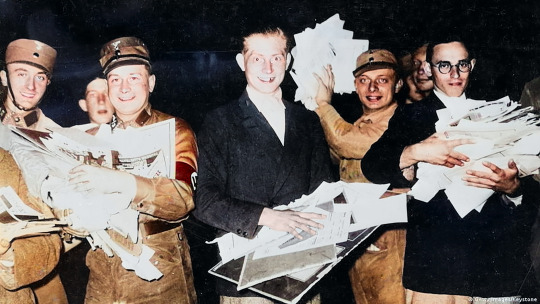
90 years ago today: On May 6th, 1933, Nazis stormed, looted, and burned Magnus Hirschfeld’s Institute for Sexual Science, Europe's center of queer and trans culture. I colorized these gruesome photos to point out this wasn't that long ago. People alive today can remember these events. We will not go back.
334 notes
·
View notes